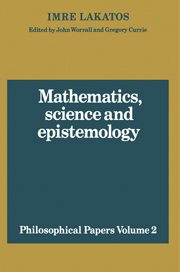Book contents
- Frontmatter
- Contents
- Editors' introduction
- PART 1 PHILOSOPHY OF MATHEMATICS
- PART 2 CRITICAL PAPERS
- 6 The problem of appraising scientific theories: three approaches
- 7 Necessity, Kneale and Popper
- 8 Changes in the problem of inductive logic
- 9 On Popperian historiography
- 10 Anomalies versus ‘crucial experiments’ (a rejoinder to Professor Grünbaum)
- 11 Understanding Toulmin
- PART 3 SCIENCE AND EDUCATION
- References
- Lakatos bibliography
- Indexes
9 - On Popperian historiography
Published online by Cambridge University Press: 09 January 2010
- Frontmatter
- Contents
- Editors' introduction
- PART 1 PHILOSOPHY OF MATHEMATICS
- PART 2 CRITICAL PAPERS
- 6 The problem of appraising scientific theories: three approaches
- 7 Necessity, Kneale and Popper
- 8 Changes in the problem of inductive logic
- 9 On Popperian historiography
- 10 Anomalies versus ‘crucial experiments’ (a rejoinder to Professor Grünbaum)
- 11 Understanding Toulmin
- PART 3 SCIENCE AND EDUCATION
- References
- Lakatos bibliography
- Indexes
Summary
If a theory of scientific rationality is too narrow, that is, if its standards are too high, then it makes too much of the actual history of science appear to be irrational – a caricature of its rational reconstruction. Historians who hold that scientific growth is the paradigm of rationality, tend, if guided by a narrow theory of rationality, either to give an impoverished, truncated account of history, or to twist historical facts in order to make the actual growth of science conform more with their image of rationality. [Popper has not been completely immune to this temptation.] In particular, he has refused to notice two [historical] facts: (i) ‘Crucial experiments’ are frequently listed first as harmless anomalies, rather than ‘refutations’ (they usually get acknowledged as ‘crucial’ only after having been backed up by some new research programme in a victorious struggle against the old programme); and (2) All important theories are born ‘refuted’. Of course, in the light of Popper's logic of discovery, the first fact is irrational: the first corroborated refutation must already be methodologically conclusive. The second fact would also make the acceptance of theories, however provisional, irrational. [No wonder then that these two facts tend to fade into the background in Popper's rational reconstruction of the history of science.]
Popper turns anomalies into ‘crucial experiments’ and exaggerates their instant impact on the development of science. In his presentation, great scientists accept refutations readily and this is the primary source of their problems.
- Type
- Chapter
- Information
- Mathematics, Science and Epistemology , pp. 201 - 210Publisher: Cambridge University PressPrint publication year: 1978
- 1
- Cited by



